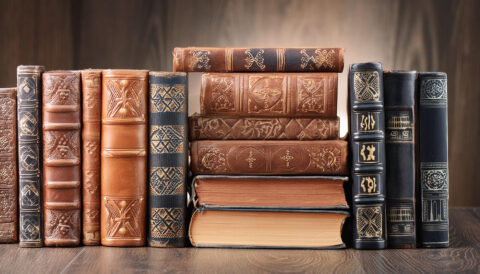Early civilization manifested to use language as mode of communication. Literature has been the source of human language. The important form of language is speech and its starts with words. The history of English Literature dates back before the Norman Conquest in 1066. The spread of Anglo-Saxon, then English as a language, was one of the significant incidents of that time. It had influences of the Viking, Latin, French, Germanic and Celtic as well as many local linguistic forces.
The great epic poem “Beowulf” is one of the oldest manuscripts. It is a 3000 lines poem. The very first part of literature found in history is the Caedmon’s Hymn. Approximately it dates back in the late seventh century. King Alfred was greatly passionate about restoring English Culture and wrote the Anglo Saxon Chronicle.
From 1066 the literary works are classified in the Middle English Period. The first great name that comes into our mind is Geofrey Chaucer (?1343-1400), he is also known as Father of English Literature. His major work is lyrical poetry and prose, he also introduced iambic pentameter line, the rhyming couplet. Troilus and Criseyde and The Canterbury Tales are major works by Chaucer. John Gower (c.1330–1408) is known for His great English poem is Confessio Amantis (The Lover’s Confession). Outstanding among the substantial fourteenth-century poems of unknown authorship is Sir Gawain and the Green Knight.
Lyric poetry in English begins in the early 16th century with the work of Sir Thomas Wyatt (1503-1542) and Henry Howard, Earl of Surrey (1517-1547). Wyatt, was influenced by the Italian, (Petrarch) introduces the sonnet and a range of short lyrics to English, while Surrey (as he is known) develops unrhymed pentameters (or blank verse). Lyric poetry in the reign of Elizabeth comes with such writers like Sir Philip Sidney (1554-1586), Edmund Spenser (1552-1599), Sir Walter Raleigh (1552-1618), Christopher Marlowe (1564-1593) and William Shakespeare (1564-1616). The major works of the time are Spenser’s Faerie Queene, Sidney’s Astrophil and Stella and Shakespeare’s sonnets.
The first great English dramatist is Chritopher Marlowe. Marlowe’s plays (Tamburlaine; Dr. Faustus; Edward II and The Jew of Malta) use the five act structure and the medium of blank verse which was followed closely by Shakespeare.
The greatest of Elizabethan lyric poets is John Donne (1572-1631). He is also known for this Metaphysical poetry. (This name, coined by Dr. Samuel Johnson in an essay of 1779). Epic poetry Long narrative poems on heroic subjects mark the best work of classical Greek (Homer’s Iliad and Odyssey). John Milton (1608-1674) wrote a great biblical epic, unsure whether to write in Latin or English, but settling for the latter in Paradise Lost. John Dryden (1631-1700) also wrote epic poetry, on classical and biblical subjects. The best poetry of the mid 18th century is the comic writing of Alexander Pope (1688-1744). Pope is the best-regarded comic writer and satirist of English poetry.Among his many masterpieces, are The Rape of the Lock.
Prose fiction and the novel – Jonathan Swift (1667-1745), wrote satires in verse and prose. He is best-known for the extended prose work Gulliver’s Travels. Another writer who is famous for prose fiction, is Daniel Defoe (1661-1731), author of Robinson Crusoe and Moll Flanders. The first English novel is generally accepted to be Pamela (1740), by Samuel Richardson (1689-1761). Henry Fielding (1707-1754) for his famous writing Tom Jones. After Fielding, the novel is dominated by the two great figures of Sir Walter Scott (1771-1832) and Jane Austen (1775-1817).
Romanticism – A movement in philosophy – romanticism is the revolt of the senses or passions against the intellect and of the individual against the consensus. It is observed in the work of William Blake (1757-1827). The publication, in 1798, by the poets William Wordsworth (1770-1850) and Samuel Taylor Coleridge (17721834) of a volume entitled Lyrical Ballads is a significant event in English literary history. Robert Burns (1759 1796) writes lyric verse in the dialect of lowland Scots (a variety of English). After Shakespeare, Burns is perhaps the most often quoted of writers in English. His Auld Lang Syne is sung every New Year’s Eve.
The work of the later romantics John Keats (1795-1821) and his friend Percy Bysshe Shelley (1792-1822; husband of Mary Shelley) is marked by an attempt to make language beautiful, and by an interest in remote history and exotic places. George Gordon, Lord Byron (1788-1824) uses romantic themes, sometimes comically, to explain contemporary events. Romanticism begins as a revolt against established views, but eventually becomes the established outlook. Wordsworth becomes a kind of national monument, while the Victorians make what was at first revolutionary seem familiar, domestic and sentimental.
The major poets of the Victorian era are Alfred, Lord Tennyson (1809-1892) and Robert Browning (1812-1889). Other Victorian poets include Browning’s wife, Elizabeth Barrett Browning (1806-1861) and Christina Rossetti (1830-1894). Gerard Manley Hopkins (1844-1889)
The greatest English novelist of the 19th century, and possibly of all time, is Charles Dickens (1812-1870). Some of his works are Great Expectations, Bleak House, Our Mutual Friend and Little Dorrit are well known to almost all students.
After the middle of the century, the novel, as a form, became firmly-established, notable authors being Anthony Trollope (1815-82), Wilkie Collins (1824-89), William Makepeace Thackeray (1811-63). Among the best novels are Collins’s The Moonstone, Thackeray’s Vanity Fair, Victorian novelists such as George Eliot (Mary Ann Evans; 1819-80) and Thomas Hardy (1840-1928).
20th century poets W.B. (William Butler) Yeats (1865-1939) is one of two figures who dominate modern poetry, the other being T.S. (Thomas Stearns) Eliot (1888-1965).
The work of these two has overshadowed the work of the best late Victorian, Edwardian and Georgian poets, some of whom came to prominence during the First World War. Among these are Thomas Hardy, Rudyard Kipling (1865-1936), A.E. Housman (1859-1936), Edward Thomas (1878-1917), Rupert Brooke (1887-1915), Siegfried Sassoon (1886-1967), Wilfred Owen (1893-1918) and Isaac Rosenberg (1890-1918).
Other notable writers of the early part of the century include George Bernard Shaw (1856-1950), H.G. Wells (1866-1946), and E.M. Forster (1879-1970). Modern writing is found in the novels of James Joyce (1882-1941), of Virginia Woolf (18821941), and of D.H. Lawrence (1885-1930). Other notable novelists include George Orwell (1903-50), Evelyn Waugh (1903-1966), Graham Greene (19041991) and the 1983 Nobel prize-winner, William Golding (1911-1993).
Poetry in the later 20th century Between the two wars, a revival of romanticism in poetry is associated with the work of W.H. (Wystan Hugh) Auden (1907-73), Louis MacNeice (1907-63) and Cecil Day-Lewis (1904-72).
References :
ALBERT, E. History of English Literature. London Nelson. 1983.
The Development of English Literature (Summary)
BURGESS, A. English Literature. Essex. Longman. (1958) 1993
ROBSON, W. A Prologue to English Literature. London. Batsford. 1986



